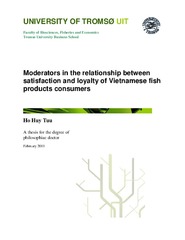Moderators in the relationship between satisfaction and loyalty of Vietnamese fish products consumers
Permanent link
https://hdl.handle.net/10037/2971View/
Thesis introduction (PDF)
Tuu, H. H., Olsen, S. O. and Linh P. T. T.: 'The moderator effects of perceived risk, objective knowledge and certainty in the satisfaction–loyalty relationship', (accepted manuscript version). Published version: Journal of Consumer Marketing, 28/5 (2011) 363–375, available at http://dx.doi.org/10.1108/07363761111150017 (PDF)
Tuu, H. H. and Olsen, S. O.: 'Certainty, risk and knowledge in the satisfaction–purchase intention relationship in a new product experiment' (submitted manuscript version). Published version, Asia Pacific Journal of Marketing and Logistics, Vol. 24 Iss: 1, pp.78 - 101, available at http://dx.doi.org/10.1108/13555851211192713 (PDF)
Date
2011-02-26Type
Doctoral thesisDoktorgradsavhandling
Author
Tuu, Huy HoAbstract
This study first discusses and tests the strength and possible different forms of the relationships between satisfaction and loyalty. Secondly, it focuses on if, and how, satisfaction strength properties (e.g. involvement, ambivalence, knowledge, and certainty) moderate the satisfaction–loyalty relationship. It also extends to discuss and test the role of perceived risk in the satisfaction–loyalty relationship. The empirical foundation for this thesis consists of three surveys and one controlled experiment on the consumption of fish products in Vietnam. The empirical findings rely mainly on multiple regression and structural equation modelling. This thesis shows the satisfaction–loyalty relationship is both linear and non-linear depending on the context and combination of the conceptual facets of satisfaction (e.g. transaction-specific versus cumulative) and loyalty (e.g. intentional versus behavioural). Second, the satisfaction–loyalty relationship is found to be affected by satisfaction strength’s properties such as involvement, ambivalence,
knowledge, and certainty in different moderating mechanism. Finally, product risk is found to influence negatively on both satisfaction and loyalty and moderate negatively the satisfaction–loyalty relationship. Thus, marketers should pay more attention to the nonlinear nature of the satisfaction–loyalty relationship to improve the accuracy of predicting loyalty. Marketing strategies, which are directed at educating consumers with relevant knowledge, to consolidate involvement and certainty towards the focal products, and to reduce consumers’ perceived risk and ambivalence, may be the most effective ways to
increase repurchase ratings.
Description
Papers number 1, 2 and 3 are not available in Munin due to publishers' restrictions:
1. Tuu, H. H. and Olsen, S. O: 'Nonlinear effects between satisfaction and loyalty: An empirical study of different conceptual relationships', Journal of Targeting, Measurement and Analysis for Marketing, 18, 239–251 (Macmillian). Available at http://dx.doi.org/10.1057/jt.2010.19
2. Tuu, H. H. and Olsen, S. O.: 'Ambivalence and involvement in the satisfaction–repurchase loyalty relationship', 2010, Australasian Marketing Journal, 18, 151–158 (Monash University). Available at http://dx.doi.org/10.1016/j.ausmj.2010.03.002
3. Tuu, H. H. and Olsen, S. O.: 'Food risk and knowledge in the satisfaction–repurchase loyalty relationship', 2009, Asia Pacific Journal of Marketing and Logistics, 21(4), 521–536 (Emerald). Available at http://dx.doi.org/10.1108/13555850910997571
1. Tuu, H. H. and Olsen, S. O: 'Nonlinear effects between satisfaction and loyalty: An empirical study of different conceptual relationships', Journal of Targeting, Measurement and Analysis for Marketing, 18, 239–251 (Macmillian). Available at http://dx.doi.org/10.1057/jt.2010.19
2. Tuu, H. H. and Olsen, S. O.: 'Ambivalence and involvement in the satisfaction–repurchase loyalty relationship', 2010, Australasian Marketing Journal, 18, 151–158 (Monash University). Available at http://dx.doi.org/10.1016/j.ausmj.2010.03.002
3. Tuu, H. H. and Olsen, S. O.: 'Food risk and knowledge in the satisfaction–repurchase loyalty relationship', 2009, Asia Pacific Journal of Marketing and Logistics, 21(4), 521–536 (Emerald). Available at http://dx.doi.org/10.1108/13555850910997571
Publisher
Universitetet i TromsøUniversity of Tromsø
Metadata
Show full item recordCollections
Copyright 2011 The Author(s)
The following license file are associated with this item:


 English
English norsk
norsk
